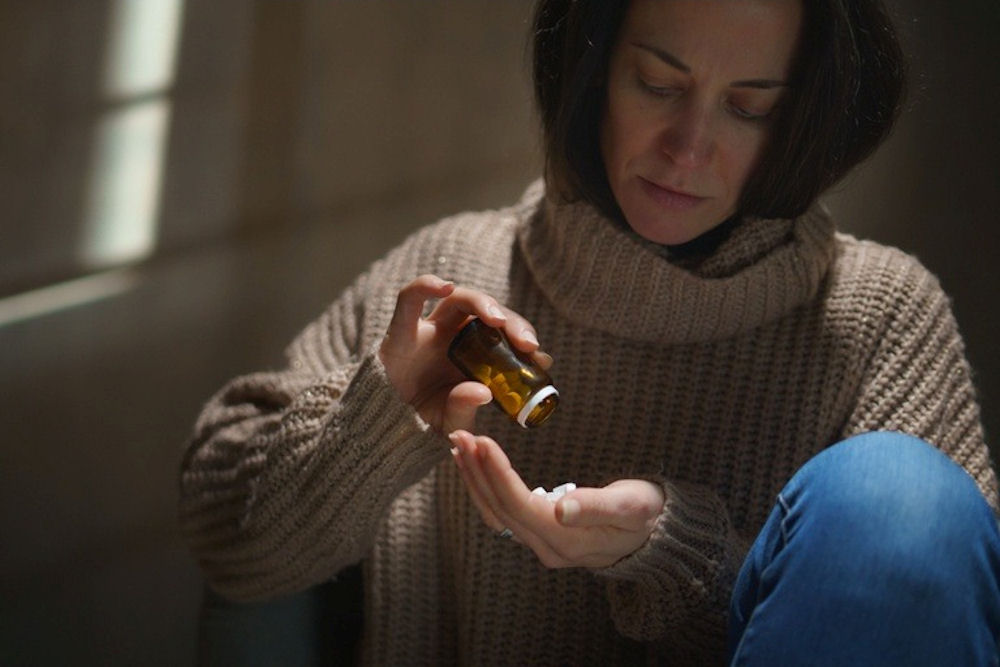One of the most dangerous practices done today by many Americans is mixing alcohol and medications, particularly painkillers. Mixing substances is not wise, particularly if both substances are potent, much like pain pills and alcohol.
There are simply far too many potential problems that could become life-threatening quite quickly when these substances are combined, and there are no benefits to be had from the combination, which is why this practice simply defies logic if people would only give it more thought.
The National Institutes of Health (NIH) released data that shows at least 42% of American adults in the US today are using medications alongside alcohol, including painkillers. This continues to remain a serious problem in the United States despite all efforts to inform the public of how dangerous this practice is.
Despite the risks associated with mixing alcohol and painkillers, effective medical detox and alcohol detox center options are available for those struggling with substance abuse at Discovery Institute in Marlboro, New Jersey.
What are the Dangers of Mixing Alcohol and Painkillers?
 In itself, alcohol can already produce serious side effects, and when mixed with other substances, such as prescription painkillers, the results could be highly dangerous. People should understand that alcohol is already a central nervous system depressant, and as such, it will already induce sedation, relaxation, and eventually sleep in the person. When combined with other substances, the brain will receive conflicting chemical signals, and this could lead to unpredictable results.
In itself, alcohol can already produce serious side effects, and when mixed with other substances, such as prescription painkillers, the results could be highly dangerous. People should understand that alcohol is already a central nervous system depressant, and as such, it will already induce sedation, relaxation, and eventually sleep in the person. When combined with other substances, the brain will receive conflicting chemical signals, and this could lead to unpredictable results.
In the case of mixing alcohol with pain pills, many prescription painkillers are also depressants, which lull the body further into rest and sleep. For some people, this could induce an unconscious state from which they could have difficulty getting out, or some of their bodily functions could suffer from the heavy depressant effect and start to slow down or even completely stop functioning. This is particularly alarming if the bodily function that is induced to slow down or stop involves breathing.
The damaging effects of alcohol alone include:
- Slurred speech
- Blurry or double vision
- Loss of physical coordination
- Confusion
- Sleepiness
- Dizziness
- Mood swings
- Impaired judgment
- Depressed breathing
- Irregular heartbeat
- Risk of injuries due to inebriation
- Belligerent behavior
- Alcohol poisoning
- Loss of inhibitions including getting into risky sexual behaviors, unprotected sex, or sex with multiple partners
- Miscarriage
- Stillbirth
- Fetal alcohol spectrum disorders (FASDs)
- Hypertension (high blood pressure)
- Risk of heart disease (cardiomyopathy, arrhythmias)
- Stroke
- Liver disease (Steatosis or fatty liver, hepatitis, fibrosis, cirrhosis)
- Digestive problems
- Various cancers (breast, mouth, throat, esophagus, voice box, liver, colon, and rectum)
- Weakening of the immune system
- Learning and memory problems
- Dementia
- Mental health problems
- Potentially increased bouts of depression and anxiety
Much like the damaging effects of alcohol, painkiller addiction also comes with many detrimental side effects, including:
- Fluctuating energy levels
- A steady increase in the number of abused painkillers
- Loss of impulse control
- Isolating
- Drowsiness
- Loss of appetite
- Development of tolerance for painkillers
- Constricted pupils
- Seizures
- Disruption of sleeping patterns
- Itchy skin
- Flushed skin or complexion
- Difficulty in breathing
- Cardiovascular issues
- Constipation
- Nausea
- Vomiting
- Disorientation
- Confusion
- Impaired memory
- Impaired decision-making ability
- Elevated anxiety
- Irritability
- Increased agitation
- Unpredictable mood swings
- Bouts of depression
The combination of alcohol with painkilling medications such as hydrocodone, oxycodone, or morphine could produce the following dangerous effects:
- Nausea
- Vomiting
- Dehydration
- Fluctuations in blood pressure
- Irregular heart rate and rhythm
- Cardiovascular instability
- Dizziness
- Loss of coordination
- Loss of inhibition
- Abnormal behavior
- Loss of consciousness
- Respiratory arrest
- Coma
Why is Mixing Alcohol with Prescription Medications Dangerous?
 When taken, alcohol moves around in the body in the same way that medications do. Once ingested, alcohol travels to the stomach to be digested and is absorbed into the bloodstream, and then circulated along with the blood throughout the body. The effects of alcohol are felt when it reaches the brain and nervous system, much like most prescription medications.
When taken, alcohol moves around in the body in the same way that medications do. Once ingested, alcohol travels to the stomach to be digested and is absorbed into the bloodstream, and then circulated along with the blood throughout the body. The effects of alcohol are felt when it reaches the brain and nervous system, much like most prescription medications.
The body then metabolizes alcohol with the help of the enzymes in the liver, and once metabolized it is then removed from the body. The problem with mixing alcohol with other potent substances, like prescription painkillers, is that if the potent substance is in the body while the liver is still metabolizing the alcohol, most of the substance will not be metabolized or broken down. As such, the substance stays in the body in harmful quantities for far longer than it should.
To make things worse, some prescription medications or substances can change how the liver produces enzymes for the metabolic process. There are also instances where some substances affect how the body typically processes function, such as sending signals from the brain to the liver that there is something in the body that needs to be metabolized.
Consider the fact that the liver, similar to the heart, does not stop working to metabolize materials in the body that need to be disposed of. This being said alcohol intake overworks the liver, adding stress until the liver is eventually damaged. Without the metabolic process of the liver to help the body filter substances, anything that is even mildly toxic will get into the bloodstream and wreak havoc on the body. This includes the necessary medications that people take for conditions they may have. The premise of the medication is that once it has done what it is supposed to do, it needs to be flushed out of the body, or there may be complications to how the body properly works.
Is there any Treatment for People Who are Addicted to Taking Painkillers and Alcohol?
Many might argue that taking alcohol and painkillers together is not an automatic sign of addiction. Perhaps it isn’t but the fact that the combination of these substances produces a habit-forming effect does not help the prior argument in any way. At the very least, people who do take prescription medication and alcohol together are harming themselves, and the fact that this is a preventable form of harm makes this act even more tragic.
For those who do already have a habit of taking alcohol and prescription medication in a manner and frequency that would constitute an addiction, the act of taking two different substances is called polydrug abuse. There are specialized treatments available for people who are afflicted with this. There is a need, however, for immediate medical attention for this condition as it may also give rise to other co-occurring disorders, which is not an uncommon occurrence for people who suffer from a substance abuse disorder.
Cognitive-Behavioral Therapy
Cognitive-behavioral therapy (CBT) is a form of addiction therapy in new jersey that identifies unhelpful ways of thinking, as well as unhelpful behavior, and makes the person realize the harm that it does to them and those around them. This is important to note as many combine prescription medications such as pain pills and alcohol recreationally, and there can be no other way to describe this behavior as unhelpful.
Even if the habit is due to a problem or trauma that the person could not handle, polydrug abuse is still an unhelpful way of thinking, as solving a problem with another problem is one of the worst ways to go about it. CBT helps the person in gaining a better understanding of how damaging these unhelpful ways of thinking are in a person’s life. In this manner, the person is made to identify their bad habits.
The premise of this approach is that once the problematic habits and way of thinking are identified, a more targeted approach to dealing with them could be done during individual therapy or group therapy.
Dialectical behavior therapy
Dialectical behavior therapy (DBT) is a modified version of CBT that is directed at helping a person develop better coping skills. This is because problematic behavior such as alcohol or substance abuse, or combining alcohol with medication is believed to be caused or triggered by issues and stressors. The person is believed to have developed a bad way of coping with these issues and stressors which is why they resorted to their bad habits. By teaching the person better ways to cope with these issues, they are not able to not give in to the “easy way out”, which is the use of substances.
This form of therapy is also believed to play a large part in moving forward in drug rehabilitation and recovery and in ensuring that a person is less prone to relapse. Relapses often occur when the person is again faced with the stressors and issues that often made them use substances before and are unable to completely deal with them.
Even when the person has completed rehabilitation, a lapse in confidence and judgment could be more than enough to drive them into a relapse. DBT can help in building their confidence and determination to choose a better response to these stressors and issues.
The Discovery Institute Can Help You with Polydrug Addiction
 A substance abuse disorder could be a subconscious response to matters and issues that the person is unable to confront, let alone deal with. In other cases, it could be an activity that simply got out of hand, leading the person down into severe dependency. In the case of alcohol and prescription medication abuse, the combination of the two presents a greater problem, as the difficulty of getting out of the habit could be even more difficult, and the damage done to the body is even greater than just having one bad habit.
A substance abuse disorder could be a subconscious response to matters and issues that the person is unable to confront, let alone deal with. In other cases, it could be an activity that simply got out of hand, leading the person down into severe dependency. In the case of alcohol and prescription medication abuse, the combination of the two presents a greater problem, as the difficulty of getting out of the habit could be even more difficult, and the damage done to the body is even greater than just having one bad habit.
We know this because we have helped so many people here at the Discovery Institute drug and alcohol rehab center with this problem, and we have seen them through the most difficult times of their recovery. We can help you too. Talk to us now.
Dr. Joseph Ranieri D.O. earned his BS in Pharmacy at Temple University School of Pharmacy in 1981 and His Doctorate Degree in Osteopathic Medicine at the Philadelphia College of Osteopathic Medicine in 1991. He is Board Certified by the American Board of Family Medicine and a Diplomate of the American Board of Preventive Medicine Addiction Certification. Dr. Ranieri has lectured extensively to physicians, nurses, counselors and laypeople about the Disease of Addiction throughout New Jersey and Pennsylvania since 2012.



